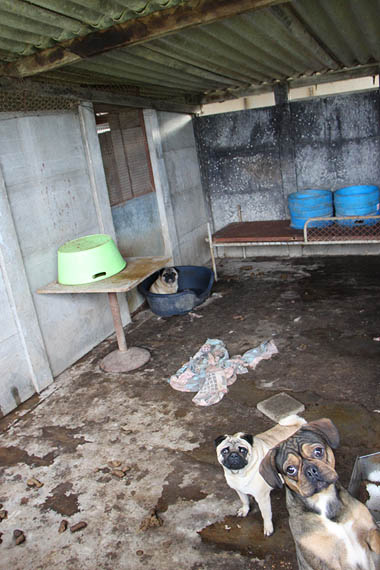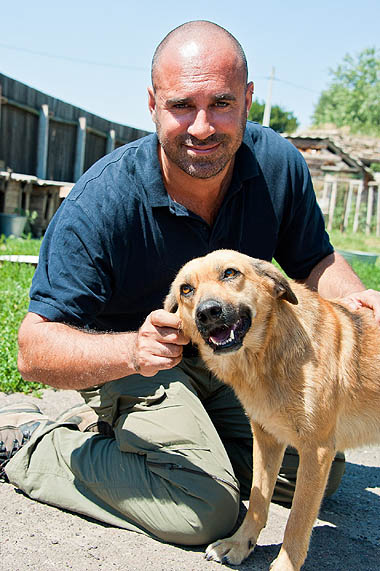Are You Planning On Giving Your Kids Rabies This Christmas?
 12 years ago
12 years ago  1805 views
1805 views
Posted
9th December, 2013 21h54
 Typical conditions in puppy farm
Animal welfare campaigners PupAid warn of dangers of giving infected puppies and kittens as Christmas presents
With the festive season just a few weeks away our thoughts are busy with what presents to get the kids, and whether these gifts will keep them entertained throughout the holidays - even into 2014.
Sadly many of us still consider puppies and kittens as suitable Christmas presents and with convenience culture strongly influencing buying behaviour it’s never been easier to buy a cute little fluffy bundle of yuletide joy; either from a pet shop, garden centre, free newspaper advert, or online.
But animal welfare campaigners ‘PupAid’ are raising awareness about the dangers of buying young puppies and kittens at Christmas especially without seeing them interacting with their mums, as this has extremely important health implications for not just the puppies and kittens, but you and your family too.
PupAid insist puppy purchasers always ask “Where’s Mum?” as nowadays puppies and kittens purchased without mum have most likely been born hundreds of miles away on cruel puppy farms in either South Wales or - following relaxation of the pet travel scheme rules - from an ever increasing supply imported from Eastern European countries, e.g. Bulgaria, Romania, and Ukraine.
Typical conditions in puppy farm
Animal welfare campaigners PupAid warn of dangers of giving infected puppies and kittens as Christmas presents
With the festive season just a few weeks away our thoughts are busy with what presents to get the kids, and whether these gifts will keep them entertained throughout the holidays - even into 2014.
Sadly many of us still consider puppies and kittens as suitable Christmas presents and with convenience culture strongly influencing buying behaviour it’s never been easier to buy a cute little fluffy bundle of yuletide joy; either from a pet shop, garden centre, free newspaper advert, or online.
But animal welfare campaigners ‘PupAid’ are raising awareness about the dangers of buying young puppies and kittens at Christmas especially without seeing them interacting with their mums, as this has extremely important health implications for not just the puppies and kittens, but you and your family too.
PupAid insist puppy purchasers always ask “Where’s Mum?” as nowadays puppies and kittens purchased without mum have most likely been born hundreds of miles away on cruel puppy farms in either South Wales or - following relaxation of the pet travel scheme rules - from an ever increasing supply imported from Eastern European countries, e.g. Bulgaria, Romania, and Ukraine.
 Marc with vaccinated dog in Ukraine. Photo credit: Julia Claxton
PupAid founder TV Vet Marc Abraham warns “Where you buy your pet from is extremely important especially because of recent cases of rabies confirmed in nearby France and Holland; meaning animals brought into the UK through the Channel Tunnel have an extremely high chance of being infected with the deadly virus, which can be transmitted to anyone - including your kids – who are at a higher risk than adults. False paperwork and animals too young means any rabies vaccination claimed is meaningless.”
Vet Marc continues “It’s all a bit too close for comfort. The risk of infected puppies and kittens entering the UK from countries where the disease is on the rise is huge; so when buying a pet we must find out as many details about the animal’s background as possible. If you want a dog, adopt from rescue or contact the Kennel Club for details of responsible breeders where you’ll always meet mum – those should be your only two options. It’s unlikely that any responsible breeder would sell a puppy at this time of year.”
Under the old system, dogs entering the country had to be microchipped, blood-tested, and vaccinated against rabies, with a quarantine period of six months. These days however, animals no longer require blood tests and are only held for 21 days following their vaccination; however the incubation period for rabies can go beyond three weeks, meaning a dog or cat infected with the disease could easily be allowed into the country.
Rabies virus lives in saliva of infected animals and can be transmitted to humans by a single bite. Although the virus’ incubation period is usually between one and three months, symptoms may take from as little as a week to as long as a year to develop. Initial signs of rabies infection include fever and pain or unusual tingling or burning sensation at the wound site.
Earlier this year PupAid launched a Government e-petition to stop puppies and kittens being sold without their mums. With huge celebrity backing, including Ricky Gervais, it’s now smashed the 100,000 signature target meaning it’ll be debated in Parliament in the spring. For more information visit: www.pupaid.org.
Marc with vaccinated dog in Ukraine. Photo credit: Julia Claxton
PupAid founder TV Vet Marc Abraham warns “Where you buy your pet from is extremely important especially because of recent cases of rabies confirmed in nearby France and Holland; meaning animals brought into the UK through the Channel Tunnel have an extremely high chance of being infected with the deadly virus, which can be transmitted to anyone - including your kids – who are at a higher risk than adults. False paperwork and animals too young means any rabies vaccination claimed is meaningless.”
Vet Marc continues “It’s all a bit too close for comfort. The risk of infected puppies and kittens entering the UK from countries where the disease is on the rise is huge; so when buying a pet we must find out as many details about the animal’s background as possible. If you want a dog, adopt from rescue or contact the Kennel Club for details of responsible breeders where you’ll always meet mum – those should be your only two options. It’s unlikely that any responsible breeder would sell a puppy at this time of year.”
Under the old system, dogs entering the country had to be microchipped, blood-tested, and vaccinated against rabies, with a quarantine period of six months. These days however, animals no longer require blood tests and are only held for 21 days following their vaccination; however the incubation period for rabies can go beyond three weeks, meaning a dog or cat infected with the disease could easily be allowed into the country.
Rabies virus lives in saliva of infected animals and can be transmitted to humans by a single bite. Although the virus’ incubation period is usually between one and three months, symptoms may take from as little as a week to as long as a year to develop. Initial signs of rabies infection include fever and pain or unusual tingling or burning sensation at the wound site.
Earlier this year PupAid launched a Government e-petition to stop puppies and kittens being sold without their mums. With huge celebrity backing, including Ricky Gervais, it’s now smashed the 100,000 signature target meaning it’ll be debated in Parliament in the spring. For more information visit: www.pupaid.org. More from
- Animus launches SkinBond Multi for enhanced wound care
- IVC Evidensia reports 82% cut in Farm antibiotic use and 20% carbon emissions reduction
- Vet professionals flock to sign up to transformative locum platform
- The ProSalus Foundation launches urgent appeal for UK vets to support Ukrainian colleagues
- Vetsure Named Business of the Year at 2025 SME National Business Awards

